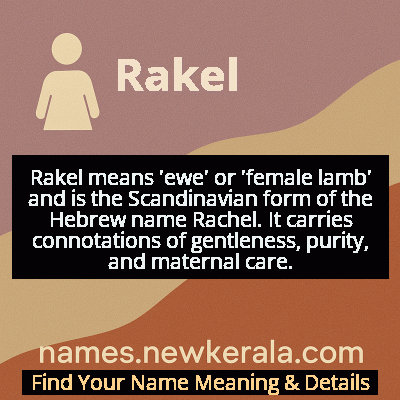Rakel Name Meaning & Details
Origin, Popularity, Numerology Analysis & Name Meaning of Rakel
Discover the origin, meaning, and cultural significance of the name RAKEL. Delve into its historical roots and explore the lasting impact it has had on communities and traditions.
Name
Rakel
Gender
Female
Origin
Hebrew
Lucky Number
2
Meaning of the Name - Rakel
Rakel means 'ewe' or 'female lamb' and is the Scandinavian form of the Hebrew name Rachel. It carries connotations of gentleness, purity, and maternal care.
Rakel - Complete Numerology Analysis
Your Numerology Number
Based on Pythagorean Numerology System
Ruling Planet
Moon
Positive Nature
Diplomatic, friendly, artistic, empathetic.
Negative Traits
Over-sensitive, moody, indecisive, prone to self-pity.
Lucky Colours
Green, cream, white.
Lucky Days
Monday.
Lucky Stones
Pearl, moonstone.
Harmony Numbers
1, 3, 4.
Best Suited Professions
Diplomats, mediators, caregivers, artists.
What People Like About You
Cooperative spirit, friendliness, artistic talent.
Famous People Named Rakel
Rakel Løki
Actress
Icelandic actress known for roles in Nordic films and television series
Rakel Mjöll
Musician
Icelandic singer and songwriter with multiple album releases
Rakel Dögg Bragadóttir
Politician
Icelandic politician and former member of parliament
Name Variations & International Equivalents
Click on blue names to explore their detailed meanings. Gray names with will be available soon.
Cultural & Historical Significance
In Scandinavian countries, particularly Iceland and Norway, Rakel became established as a distinct form of the name, maintaining the biblical connection while adapting to Nordic linguistic patterns. The name represents both ancient Hebrew heritage and its transmission through European Christian naming traditions. Throughout history, women named Rakel have carried forward this legacy of strength, faith, and maternal devotion, making the name a bridge between ancient Middle Eastern origins and modern Scandinavian identity.
Extended Personality Analysis
Women named Rakel are often perceived as gentle yet resilient, combining traditional feminine qualities with inner strength. They tend to be nurturing and compassionate, with a deep capacity for caring for others, much like the protective nature of a ewe with her lambs. At the same time, they often possess quiet determination and the ability to endure challenges with grace.
Rakels are frequently described as intuitive and emotionally intelligent, able to read situations and people with sensitivity. They value close relationships and family connections, often serving as emotional anchors in their social circles. While they may appear soft-spoken, they typically have strong convictions and moral compasses that guide their decisions. Their combination of gentleness and resilience makes them both approachable and respected, capable of providing comfort during difficult times while maintaining their own sense of purpose and direction.
Modern Usage & Popularity
Rakel remains most popular in Scandinavian countries, particularly Iceland where it has maintained consistent usage. In Norway, it experienced peak popularity in the late 19th and early 20th centuries and continues as a traditional choice. The name has seen some revival in recent years as part of the trend toward classic, meaningful names with international appeal. While not common in English-speaking countries, it appears occasionally among families with Scandinavian heritage or those seeking distinctive biblical names. The name's simplicity and cross-cultural recognition contribute to its enduring appeal, offering a familiar yet distinctive alternative to the more common Rachel.
Symbolic & Spiritual Meanings
Symbolically, Rakel represents innocence, purity, and maternal protection, drawing from its meaning of 'ewe' or 'female lamb.' The lamb imagery connects to themes of gentleness, sacrifice, and new beginnings across multiple cultural traditions. In Christian symbolism, the lamb represents Christ and spiritual purity, while in broader contexts it signifies vulnerability protected by strength. The name also carries connotations of fertility and motherhood from the biblical Rachel's story, symbolizing both the joy and sorrow inherent in creation and nurturing. As a Scandinavian adaptation of an ancient Hebrew name, it embodies the transmission of cultural and spiritual values across time and geography, representing both rooted tradition and adaptive resilience.

